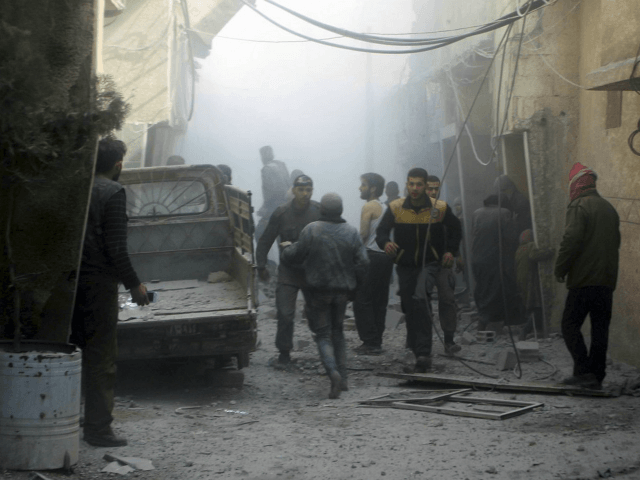DOUMA, Syria (AFP) — Fresh regime air strikes and heavy clashes shook Syria’s rebel enclave of Eastern Ghouta on Sunday, despite a UN demand for a ceasefire to end one of the most ferocious assaults of Syria’s civil war.
After days of diplomatic wrangling, the Security Council on Saturday adopted a resolution calling for a 30-day ceasefire in Syria “without delay,” to allow for aid deliveries and medical evacuations.
President Bashar Assad’s forces launched a major bombing campaign against the enclave on the edge of Damascus a week ago, and have since killed more than 500 people.
The United Nations resolution has raised hopes of stemming the bloodshed, but it remains unclear when or how broadly the ceasefire can be implemented.
Russia is a key ally of Assad’s regime. In a phone call on Sunday, German Chancellor Angela Merkel and French President Emmanuel Macron urged President Vladimir Putin to use his influence to produce a truce.
They called on Russia “to exercise maximum pressure on the Syrian regime to achieve an immediate suspension of air raids and fighting,” Merkel’s office said in a statement.
Pope Francis also joined international calls for a ceasefire, saying in his Sunday Angelus prayers: “All this is inhuman. One cannot fight evil with another evil.”
In Douma, the main town in Eastern Ghouta, fresh air raids and artillery strikes could be heard on Sunday, an AFP correspondent in the town said.
Ground fighting intensifies
At least eight civilians were killed in strikes on Sunday, according to the Syrian Observatory for Human Rights monitoring group, bringing the total number of dead for the past week to 529, including 130 children.
An aid worker in Douma, quoted by British charity Save the Children, said there was bombing, “just like any other day.”
“There are loud noises coming from the front lines. The surveillance planes are above our heads, jet fighters, and elephant rockets,” the unnamed aid worker was quoted as saying.
Another aid worker quoted by the charity said a brief pause in the bombing had prompted people to emerge after a week sheltering in basements, saying: Some people spent these past seven days sitting on the ground. Some people had no food to eat for two or three days.”
Observatory chief Rami Abdel Rahman said there appeared be fewer air strikes but that fighting had intensified on the ground.
Heavy clashes erupted in southern areas of Eastern Ghouta, killing at least 13 members of pro-regime forces and six fighters from the Jaish al-Islam rebel group, he said.
The Britain-based group uses a network of sources across Syria to monitor the country’s conflict.
Mohamed Alloush, a key figure in Jaish al-Islam, tweeted that the rebels were “resisting” bids by regime forces to enter the region.
Eastern Ghouta, home to some 400,000 people, is surrounded by government-controlled territory and its residents are unwilling or unable to flee.
The two main rebel groups controlling the enclave — Jaish al-Islam and Faylaq al-Rahman — welcomed the Security Council demand, but vowed to fight back in case of renewed attacks.
UN diplomats say the resolution was watered down to ensure it was not vetoed by Russia, which has provided diplomatic and military support to Assad’s regime.
Language specifying that the ceasefire would start 72 hours after adoption was scrapped, and the term “immediate” was dropped, in reference to aid deliveries and evacuations.
In another concession, the ceasefire would not apply to operations against the Islamic State group or Al-Qaeda, along with “individuals, groups, undertakings and entities” associated with the groups.
Syria’s former Al-Qaeda affiliate is present in Eastern Ghouta and Assad’s regime routinely describes all of its opponents as “terrorists.”
The head of the army in Iran, another key Assad ally, said the Syrian military would continue to target “terrorist groups” in Eastern Ghouta.
“The zones on the periphery of Damascus… are not covered by the ceasefire and the offensives and clearing operations by the Syrian army will continue,” said Mohammad Bagheri, according to the official IRNA news agency.
UN chief Antonio Guterres, who has described Eastern Ghouta under the bombardment as “hell on Earth,” said the ceasefire must be “immediately” implemented.
‘Used to betrayals’
In the enclave, news of the UN vote was greeted with a shrug.
“I don’t think this decision will be implemented. It will be respected neither by the regime nor Russia,” said Douma resident Abu Mazen.
Syrian medics tend to a baby, as a child cries next to them at a makeshift clinic following Syrian government bombardments in Douma, in the besieged Eastern Ghouta region on the outskirts of the capital Damascus, on February 22, 2018. (AFP/Hamza Al-Ajweh)
“We can’t trust Russia or the regime. We are used to their betrayals.”
Rebels in Eastern Ghouta have also been firing into Damascus.
Around 20 people have been killed in eastern districts of the capital since February 18, according to state media.
A total of more than 340,000 people have been killed, and millions driven from the homes in Syria’s war, which next month enters its eighth year, with no diplomatic solution in sight.

COMMENTS
Please let us know if you're having issues with commenting.